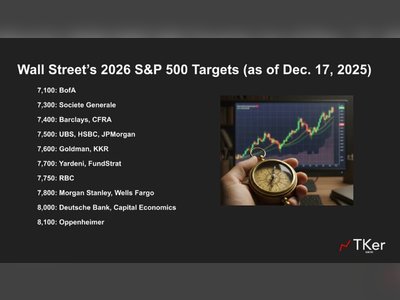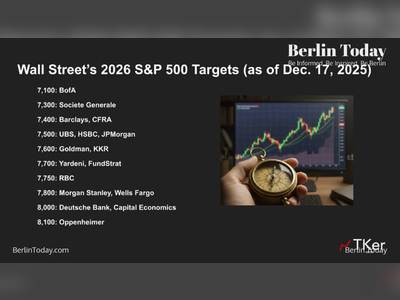
Global Markets React to New U.S. Tariffs Amid Economic Concerns
Investor anxiety escalates as sharp market downturns heighten fears of a potential recession linked to President Trump's tariff measures.
Global financial markets experienced significant downturns following the announcement of new tariffs by U.S. President Donald Trump, generating widespread concerns over a potential recession.
On the first trading day after the tariffs were revealed, major stock indices worldwide, including the German DAX and the British FTSE, faced considerable declines.
The tariffs, primarily aimed at Chinese imports, triggered investor fears of increased market volatility.
In response to the heightened uncertainties, investors engaged in substantial sell-offs across various stock markets.
Concurrently, U.S. Treasury bond prices rallied, reflecting a flight to safety among investors amid rising tensions.
Jamie Dimon, CEO of JP Morgan Chase, highlighted mounting concerns regarding the increased likelihood of a recession, which influenced investor sentiment in the United States.
Reports indicated that the implementation of these tariffs led to significant fluctuations in asset prices across numerous sectors.
An economist criticized the administration for alleged misinterpretations of tariff-related data, arguing that the economic burden would largely fall on American consumers instead of foreign companies, undermining the justification offered by government officials.
Public opinion within the United States regarding the tariffs appears divided.
A recent poll revealed that approximately 73% of respondents anticipate price hikes in the wake of the tariffs, while 57% opposed the measures outright.
Conversely, 39% of those surveyed expressed support for the government's position, with some citing a belief that American manufacturing is unfairly disadvantaged in global trade.
In related developments, Italian Prime Minister Giorgia Meloni outlined a negotiating strategy concerning the tariffs after discussions with U.S. officials.
She proposed a 'zero-for-zero' tariff plan aimed at eliminating mutual tariffs on industrial products, a proposal that garnered support from European Union officials and underscored the tariffs' broader implications for international trade relations.
As the trade stalemate continues, the European Union has urged a firm response to the tariffs, citing the need for a fair trading environment to maintain global economic stability.
Concerns have also emerged regarding the implications of ongoing trade disruptions, particularly in relation to inflation risks and potential challenges to monetary policy normalization within the Eurozone.
In Asia, some markets displayed relative resilience, with selective recoveries noted in trading.
The Nikkei index in Japan reported a notable increase, while Hong Kong's Hang Seng Index experienced modest gains.
However, overall market sentiment remains cautious as investors closely monitor any developments that may indicate shifts in trade policy.
On the first trading day after the tariffs were revealed, major stock indices worldwide, including the German DAX and the British FTSE, faced considerable declines.
The tariffs, primarily aimed at Chinese imports, triggered investor fears of increased market volatility.
In response to the heightened uncertainties, investors engaged in substantial sell-offs across various stock markets.
Concurrently, U.S. Treasury bond prices rallied, reflecting a flight to safety among investors amid rising tensions.
Jamie Dimon, CEO of JP Morgan Chase, highlighted mounting concerns regarding the increased likelihood of a recession, which influenced investor sentiment in the United States.
Reports indicated that the implementation of these tariffs led to significant fluctuations in asset prices across numerous sectors.
An economist criticized the administration for alleged misinterpretations of tariff-related data, arguing that the economic burden would largely fall on American consumers instead of foreign companies, undermining the justification offered by government officials.
Public opinion within the United States regarding the tariffs appears divided.
A recent poll revealed that approximately 73% of respondents anticipate price hikes in the wake of the tariffs, while 57% opposed the measures outright.
Conversely, 39% of those surveyed expressed support for the government's position, with some citing a belief that American manufacturing is unfairly disadvantaged in global trade.
In related developments, Italian Prime Minister Giorgia Meloni outlined a negotiating strategy concerning the tariffs after discussions with U.S. officials.
She proposed a 'zero-for-zero' tariff plan aimed at eliminating mutual tariffs on industrial products, a proposal that garnered support from European Union officials and underscored the tariffs' broader implications for international trade relations.
As the trade stalemate continues, the European Union has urged a firm response to the tariffs, citing the need for a fair trading environment to maintain global economic stability.
Concerns have also emerged regarding the implications of ongoing trade disruptions, particularly in relation to inflation risks and potential challenges to monetary policy normalization within the Eurozone.
In Asia, some markets displayed relative resilience, with selective recoveries noted in trading.
The Nikkei index in Japan reported a notable increase, while Hong Kong's Hang Seng Index experienced modest gains.
However, overall market sentiment remains cautious as investors closely monitor any developments that may indicate shifts in trade policy.
AI Disclaimer: An advanced artificial intelligence (AI) system generated the content of this page on its own. This innovative technology conducts extensive research from a variety of reliable sources, performs rigorous fact-checking and verification, cleans up and balances biased or manipulated content, and presents a minimal factual summary that is just enough yet essential for you to function as an informed and educated citizen. Please keep in mind, however, that this system is an evolving technology, and as a result, the article may contain accidental inaccuracies or errors. We urge you to help us improve our site by reporting any inaccuracies you find using the "Contact Us" link at the bottom of this page. Your helpful feedback helps us improve our system and deliver more precise content. When you find an article of interest here, please look for the full and extensive coverage of this topic in traditional news sources, as they are written by professional journalists that we try to support, not replace. We appreciate your understanding and assistance.











